When navigating through stress and uncertainty what are some of the ways we might develop resilience and collective care in a time of Deep Change?
By Lindsay Alderton
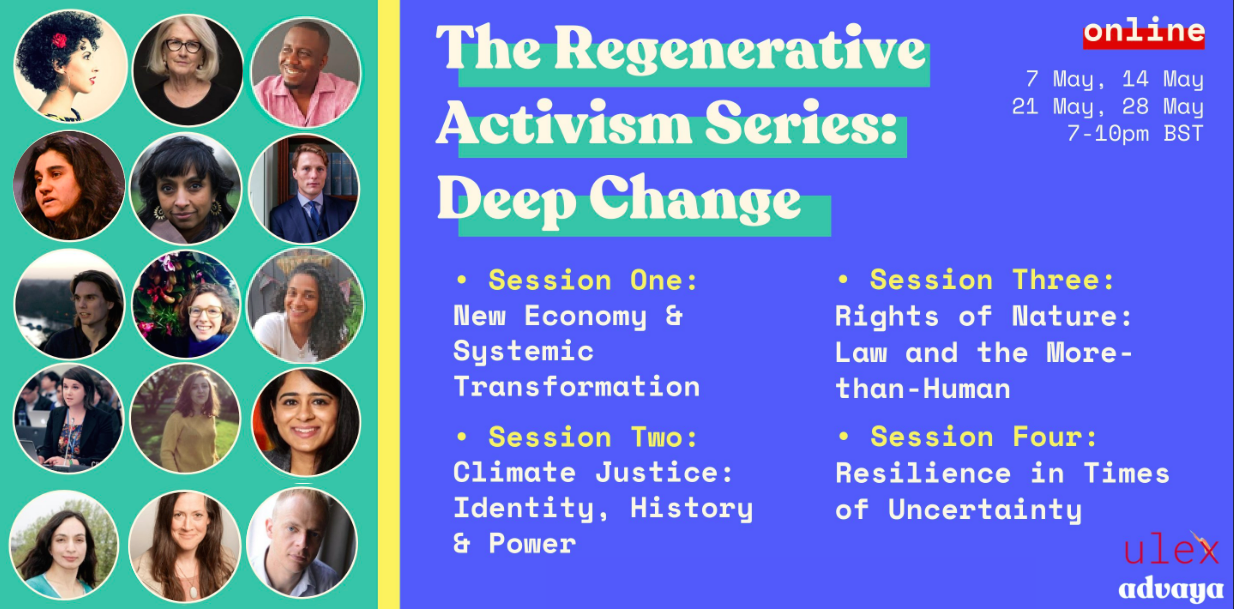
Seven months into 2020 and the principle of uncertainty is increasingly becoming the new normal amidst multiple colliding crises across ecological, socio-political and spiritual spheres. The arrival of the coronavirus pandemic in the early part of the year exacerbated a global public health and economic crisis which was already underpinned by staggering levels of inequity, further compounded in recent weeks with the murder of George Floyd, and huge numbers taking to the streets to demand justice for black lives. There is no doubt that we are living at a critical moment in history – a momentous series of disruptions pointing to a pressing need for radical transformation. The future is uncertain and the narrative up for grabs.
Amidst this backdrop, the theme of the Ulex Project’s 2020 Regenerative Activism conference – Deep Change – was particularly pertinent. For the third year running, in collaboration with Advaya and Gita Pariher, hundreds of participants took part – this time in the online space across a four week series of webinars in May. It was an opportunity to hear from a range of leading activists, doers, and thinkers seeking to get under the surface of these crises and to ask deeper questions around strategies for deep change. You can watch the full series here.
We asked some of the contributing panelists to share some of their own tools and practices for navigating through uncertainty and change.
HIBA AHMAD: Climate justice activist, Our Future Now.
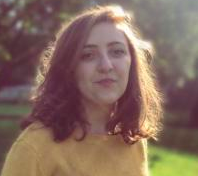
Hiba Ahmad is a climate justice activist at Our Future Now. She organises against climate ignorance and green colonialism and for social justice for all.
“To navigate through uncertainty and change we need to first of all inhabit a broader understanding of how things got to be ‘the way they are’ so that we are better equipped to embrace complexity. We have to understand how the injustices that are built into our socio-economic hierarchies – sexism, abelism, racism and homophobia – uphold these systems, and we need to understand our roles within that. Different people from different backgrounds are disproportionately affected by these crises, and so we need to continuously be aware of that and to challenge, unpack, unlearn, relearn, and integrate new ways of being within ourselves and our social structures. Sometimes that means taking a step back, listening, internalising before responding and taking action.”
EWERYST ZAREMBA : Spina Collective and ULEX trainer.
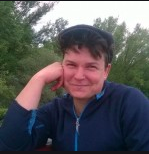
Eweryst Zaremba is a social activist and trainer whose work is primarily with grassroots groups involved in social and environmental struggles in Poland and internationally. As a member of the SPINA collective Ewe is also involved in trauma and emotional support currently dedicating most of their time to feminist, trans* and queer struggles. They are a member of the Ulex core team.
“When it comes to dealing with uncertainty I find that connecting to the bigger picture is essential. I do this by centering my body, feeling my feet rooted to the ground and my spine reaching up towards the sky. Rooting myself in the physical supports me to stay grounded in the present moment with a sense of all the past movements, struggles and my ancestors at my back, ready and open to the uncertainties of the future out front. I also regularly connect to my motivation to do what I can, to connect with what matters, to reaffirm my intention to act without clinging to specific outcomes and results.”
DEAN & AESHA FRANCIS: Founders, Urban Mindfulness Foundation.
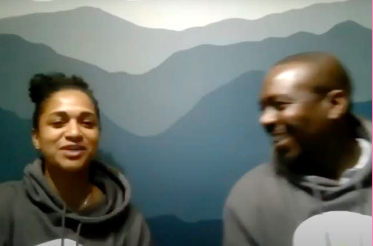
Dean and Aesha Francis are co-founders of the Urban Mindfulness Foundation, a not-for-profit social enterprise centred around socially focused mindfulness practices that place the emphasis on radical inclusion and collaboration designed to help embrace the challenges of urban living.
“Times like these require a collaborative rather than a personal response because we need a more nuanced understanding of the wider social and ecological concerns that impact all of us individually and collectively – though certainly not equally! Mindfulness alone cannot provide all of the answers, but it can help us recognise an ‘addiction to certainty’ which is often based on many false and conditioned narratives as a result of a particular social and cultural framework of reference. Importantly, when we observe these processes in meditation, we can realise their transience. These insights then invite us into a new relationship with uncertainty and change which can be more supportive in these current times.”
NICK DEARDEN: Director, Global Justice Now.
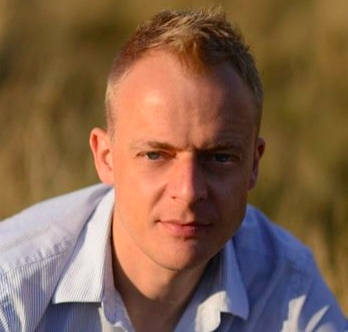
Nick Dearden is director of Global Justice Now, a campaign group that mobilises people in the UK for change, and acts in solidarity with those fighting injustice, particularly in the global south. Previously, he was director at Jubilee Debt Campaign.
“It’s important to remember that amidst this period of uncertainty and flux that there is no inevitability about what will happen next, and it’s up to us to collectively shape the future we want to see. We’re at a crossroads where it is clearly evident to the vast majority of people in the world that the systems we’re living in aren’t sustainable and we need to find a way out of it. That way could be towards more ‘strongmen’ populist leaders such as Trump, Bolsanaro and Modi and an increase in fascism, or it could move towards the democratization of our economy and making it work for the public good. We need to use our power to shape that future, and each of us need to find our own set of regenerative practices to help us stay sane through the struggles of these times.”
CARLOTTA BYRNE: Earth Jurisprudence Coordinator at The Gaia Foundation.
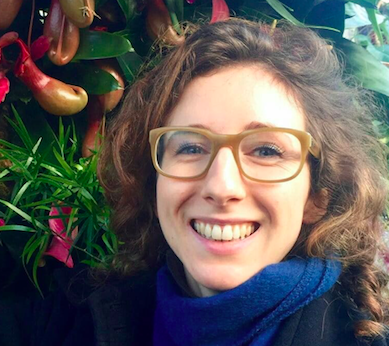
Carlotta Byrne coordinates the Earth Jurisprudence Programme at The Gaia Foundation accompanying a growing network of Earth Jurisprudence Practitioners in Africa who are working at a local, national and regional level to revive Earth-centred governance on the continent.
“Many of the crises of our times emerge from the breakdown of the human-Earth relationship within dominant, western culture: respect and reciprocity have been replaced by exploitation and extraction, communality by consumerism. Practices that reawaken our sense of belonging to a vibrant web of life are vital to ground and orient us in this context. This could be as simple as venturing outside, barefoot perhaps, in attentive awareness of the natural world of which you are a part. Or marking the Earth’s cycles, such as the day’s dawn and dusk or the turn of the seasons, and feeling yourself to be a small part of an immense and sacred universe.”
JYOTI FERNANDES: Director and Campaigns Coordinator, Landworkers Alliance.
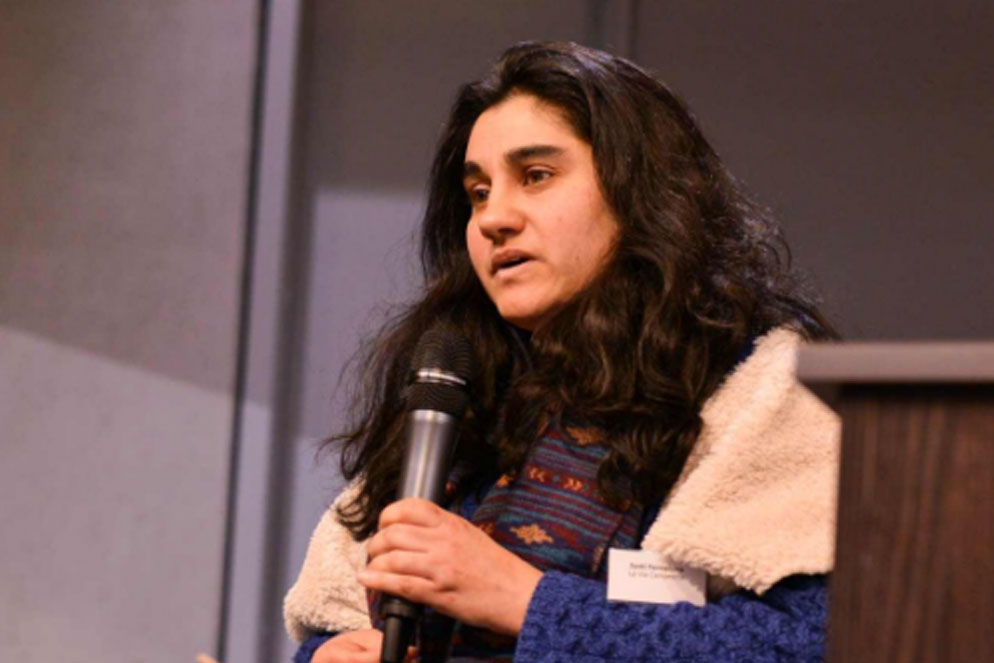
Jyoti Fernandes is a Director of and Campaigns Coordinator for the Landworkers Alliance, which is a member of La Via Campesina and is currently working on a campaign to influence DEFRA to adopt more policies to promote food sovereignty. Alongside working to represent small-scale producers in Westminster and global agricultural institutions Jyoti is also a Dorset smallholder farmer on a 20 acre low impact holding, a butcher, and land rights activist.
“I think it’s key that we have a feeling that we’re a part of something that’s larger than ourselves. This greater sense of solidarity provides a sense of stability amidst the flux and change. The power of social movements come because there’s space for everyone, and everyone brings their different skills and gifts. We’ve witnessed this within peasant farmer networks, in that a farmer in Africa can be in communication via whatsapp with a farmer in India, and together they will share strategies and struggles and feel a part of a common story. This larger sense of meaning is empowering even amidst upheaval and uncertainty.”
LAURA GUARCH : Co-Director, Convex.
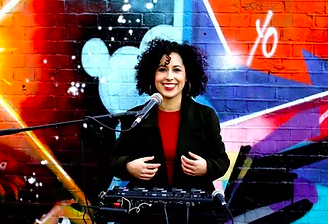
Laura Roig Guarch is a co-director of the artistic company Convex, who create site-specific performances that challenge social perceptions of place and environment. Her most recent performance, Thalweg,was a participatory performance project set along the Thames exploring river rights.
“While I find it challenging to plan for the future, I find comfort in anchoring to the present. Connecting to nature and dedicating time to do what I love, which in my case is music and singing, is what keeps me afloat. I really enjoy local walks and bike rides through parks, greens and woods in South East London. Discovering in more depth my local environment has been a very pleasant asset in this strange and uncertain period. I recommend meditation, walking, writing, singing and doing anything creative in your daily lives that allows you to be playful, present, silly, connected!”
SHAUN CHAMBERLIN: Author & Activist, Dark Optimism
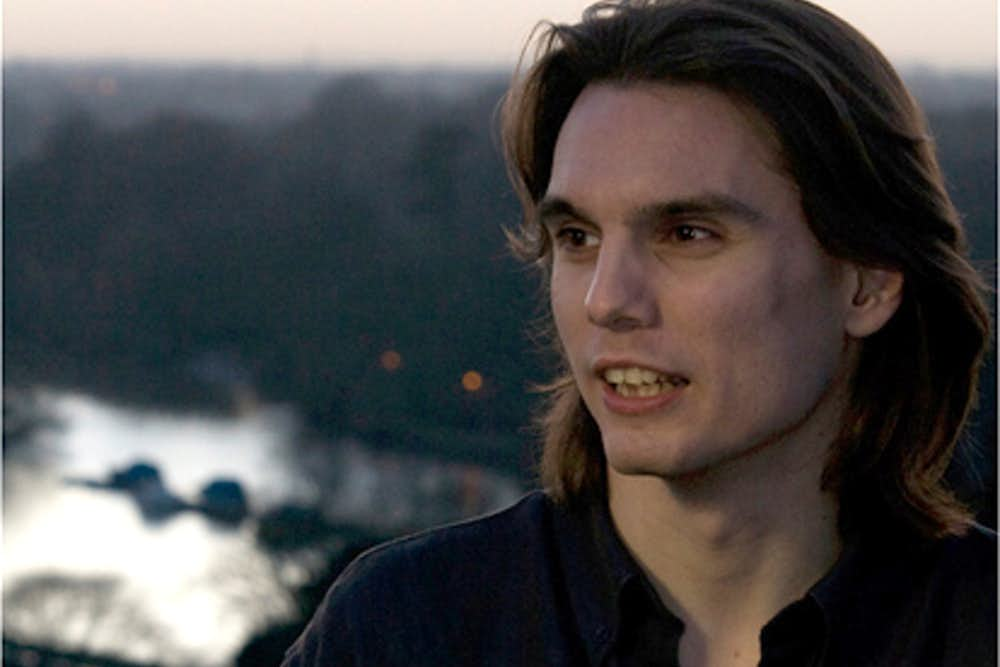
Shaun Chamberlin has been involved with the Transition Network since its inception, authoring the movement’s second book, The Transition Timeline. He was chair of the Ecological Land Co-operative and one of Extinction Rebellion’s first arrestees, and has written and edited diverse publications including Surviving the Future: Culture, Carnival, and Capital in the Aftermath of the Market Economy, as well as producing new film The Sequel: What Will Follow Our Troubled Civilisation? His website is www.darkoptimism.org
“When it comes to navigating through uncertainty and change it takes bravery to sit in the space between stories. Amid such turmoil, a lot of the reference points by which we make sense of our value and our life can be lost. The story that we told ourselves about what the point of it all is can start to lose its resonance, and it can be tempting to either suppress our awareness of this shift, or to quickly grab hold of a new story to fill the void. The void is a profoundly uncomfortable place to be. But it is a fertile one, and if we can stay with it – face the grief of our lostness – it always ultimately brings us to a more deeply-grounded sense of our place in the world. A world that we cannot not change by our choices, for better or worse.”
SHIVALI FULCHAND: British Medical Journal, Key Coordinator, ‘Year of Climate Change’

Shivali Fulchand is a junior doctor and editor at The British Medical Journal and a key coordinator for their ‘Year of Climate Change’ campaign. Within her faith community, Shivali works to engage youth members with environmental issues and is also the London Project Co-ordinator of The Bhumi Project, a global platform representing the Hindu voice on environmental issues
“In these times amidst the covid-19 pandemic and prevailing race issues I often hear ‘change is the only constant’ which could not hold more true than for events we are experiencing now. My meditative practice connects me with a deeper essence that goes beyond the physical and mental being, and that keeps me grounded in difficult times. There is one verse from the ancient Bhagavad Gita that I reflect upon, almost daily: “The non-permanent appearance of happiness and distress, and their disappearance in due course, are like the appearance and disappearance of winter and summer seasons. They arise from sense perception and one must learn to tolerate them without being disturbed.” Recognising we are all deeply interconnected renews my purpose for building a world fit for everyone to live in happily.
ANTHEA LAWSON: Activist and Author, Perspectiva
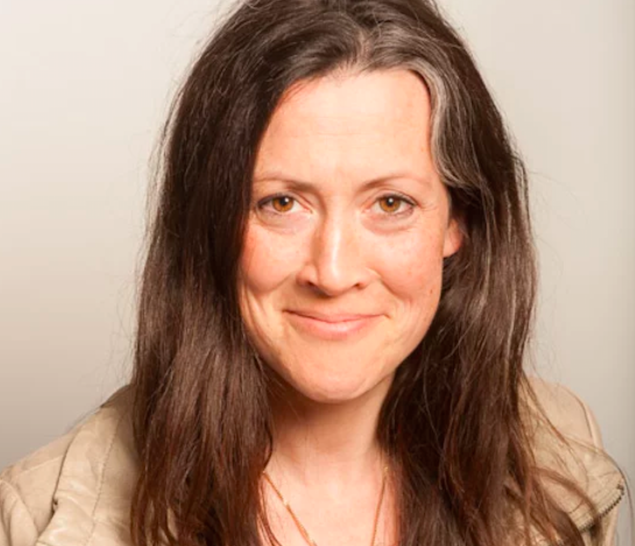
Anthea Lawson is an activist, writer and associate of Perspectiva whose book The Entangled Activist will be published in 2020.
“Amidst uncertainty it’s important that we remind ourselves that it’s okay to not know everything, to not know all the answers. That we do what we can regardless. That we hold an overall intention whilst at the same time not berating ourselves if what we can do is limited by the existing conditions. Coupled with this for me is making time for stillness – be that in meditative practice, or whether it’s going for a walk, not using my phone or filling my mind, but just walking, noticing what’s going on around me, letting the thoughts unravel, letting the white noise settle. Soon enough the repeated loops will drop away and more generative ideas start to arise. Without fail I end up feeling better.”
To watch the full 4-part webinar series visit:
Ulex Project & Advaya: Deep Change Regenerative Activism series 2020
READ ON: Sustaining Resistance : A Story of Regenerative Organising »»»